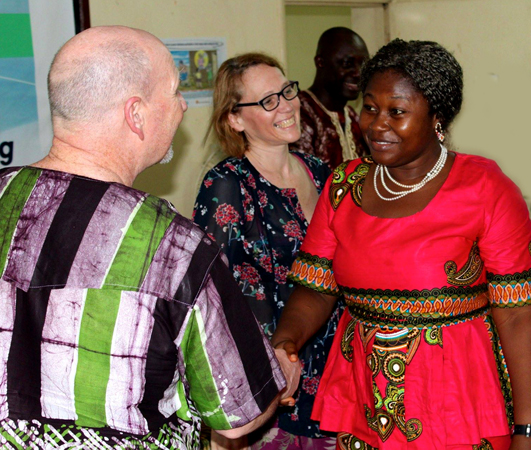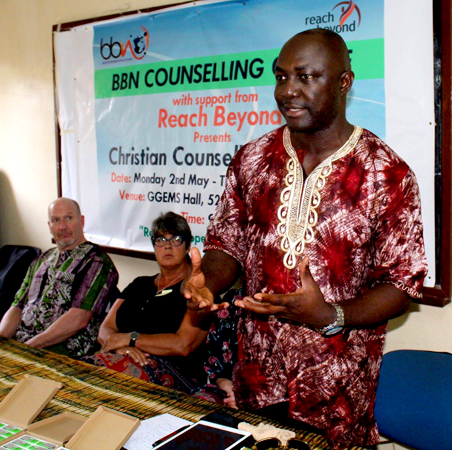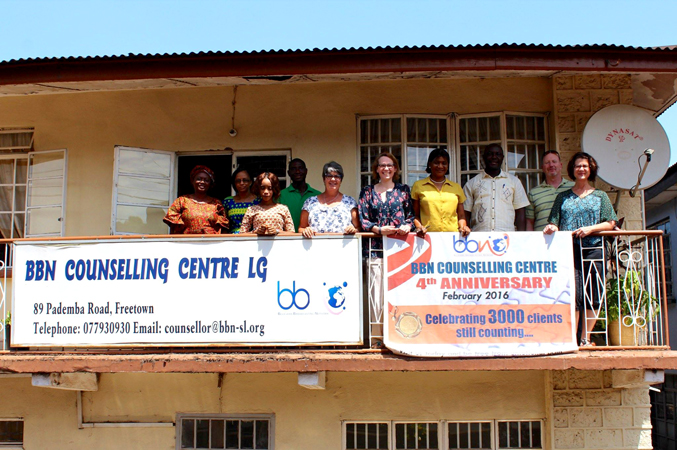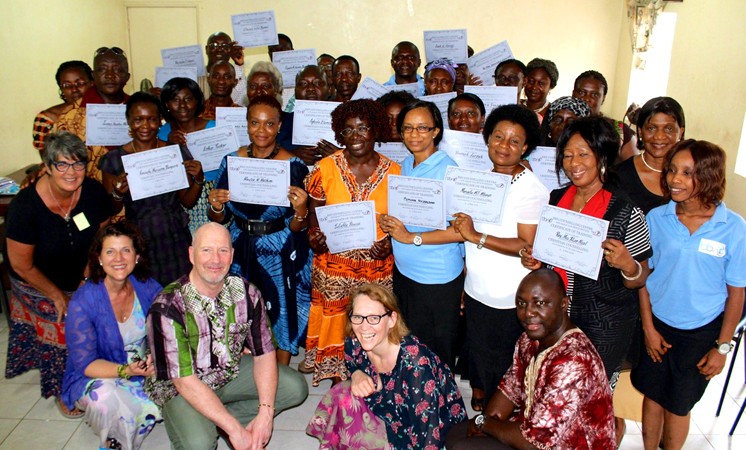MENU
(July 5, 2016 - by Harold Goerzen) First it was war. Then it was Ebola. These two crises, along with pervasive poverty and famine, have left a nation in trauma.
An estimated 50,000 people in the West African country of Sierra Leone, ranked by the International Monetary Fund as the world’s 14th poorest country, died in the country’s brutal, decade-long civil war that ended in 2002. Thousands more were maimed and mutilated; 2 million others fled to Guinea and Liberia.
 Then in 2014, Ebola hit Sierra Leone, resulting in over 14,000 cases and nearly 4,000 deaths before it was contained, making it one of the hardest-hit nations in the region.
Then in 2014, Ebola hit Sierra Leone, resulting in over 14,000 cases and nearly 4,000 deaths before it was contained, making it one of the hardest-hit nations in the region.
An estimated 500,000 people—nearly 10 percent of the population—suffer from anxiety disorders such as post-traumatic stress syndrome (PTSD), according to Kenny Dennis who recently led four days of counselor training for 25 pastors and church leaders in the capital city of Freetown.
“In the entire country there’s only one psychiatrist, two nurse practitioners and very few mental health workers,” he related. “The need is extreme.”
“You see all of the devastation, but the hearts of the people are so warm,” observed his wife, Lauri, human resources director at Reach Beyond, who helped with logistics. Team members also included Reach Beyond’s Lee Sonius and Sheila Leech along with psychologist Dr. Ana Draper from the U.K.
Dennis said participants at the May 2-5 training were eager to bring hope and encouragement to their congregants and people in their communities who have trouble coping with the stress.
 “You’re looking at a country where people did atrocious things to each other … death everywhere,” explained Dennis, a licensed professional counselor whose practice in Colorado Springs, Colo., specializes in trauma and stress cases. “When the civil war ended, everybody got amnesty. Imagine living next door to someone who a week earlier could have been killing you, and now you’re supposed to go on like nothing has ever transpired.”
“You’re looking at a country where people did atrocious things to each other … death everywhere,” explained Dennis, a licensed professional counselor whose practice in Colorado Springs, Colo., specializes in trauma and stress cases. “When the civil war ended, everybody got amnesty. Imagine living next door to someone who a week earlier could have been killing you, and now you’re supposed to go on like nothing has ever transpired.”
During the Ebola crisis people spent “at least a year in deep fear, afraid they would contract the disease and grieving because they knew someone who died of it,” he related. “Schools closed for a year. If you stuck out your hand to shake hands with someone, it was a $100 fine. Even Christmas was canceled.”
The training was hosted by partner Ransford Wright, director of Believers Broadcasting Network which operates a Christian radio station and a drop-in counseling center in Freetown that opened five years ago. A bigger, more spacious facility is being planned.
Many of the 3,000 people who have come to the center heard about it through the broadcasts on the station—especially the live, late-night call-in show that aims to help traumatized listeners.
 Wright launched the show some 12 years ago despite naysayers who said he was “crazy” because Sierra Leonians don’t like to talk about their problems. But the program, airing from midnight to 4 a.m. three nights a week, is always filled with callers.
Wright launched the show some 12 years ago despite naysayers who said he was “crazy” because Sierra Leonians don’t like to talk about their problems. But the program, airing from midnight to 4 a.m. three nights a week, is always filled with callers.
“It’s remarkable what visionaries BBN has been in seeing the needs of the country,” said Dennis, adding that many of the people who come to the center are unbelievers. “A lot of interest is from Muslims who come for counseling and leave satisfied … sometimes they’re saved.”
 Dennis said he’s received much “positive feedback” from those at the training, especially since he taught clinical methods on helping people deal with trauma from a biblical worldview.
Dennis said he’s received much “positive feedback” from those at the training, especially since he taught clinical methods on helping people deal with trauma from a biblical worldview.
“At the end of the training we handed out packets, and everything was recorded and put on a thumb drive,” he added. “I’ll also be available for weekly consultations to answer questions online, talk about issues and apply principles from the training.”
Source: Reach Beyond
An estimated 50,000 people in the West African country of Sierra Leone, ranked by the International Monetary Fund as the world’s 14th poorest country, died in the country’s brutal, decade-long civil war that ended in 2002. Thousands more were maimed and mutilated; 2 million others fled to Guinea and Liberia.
 Then in 2014, Ebola hit Sierra Leone, resulting in over 14,000 cases and nearly 4,000 deaths before it was contained, making it one of the hardest-hit nations in the region.
Then in 2014, Ebola hit Sierra Leone, resulting in over 14,000 cases and nearly 4,000 deaths before it was contained, making it one of the hardest-hit nations in the region.An estimated 500,000 people—nearly 10 percent of the population—suffer from anxiety disorders such as post-traumatic stress syndrome (PTSD), according to Kenny Dennis who recently led four days of counselor training for 25 pastors and church leaders in the capital city of Freetown.
“In the entire country there’s only one psychiatrist, two nurse practitioners and very few mental health workers,” he related. “The need is extreme.”
“You see all of the devastation, but the hearts of the people are so warm,” observed his wife, Lauri, human resources director at Reach Beyond, who helped with logistics. Team members also included Reach Beyond’s Lee Sonius and Sheila Leech along with psychologist Dr. Ana Draper from the U.K.
Dennis said participants at the May 2-5 training were eager to bring hope and encouragement to their congregants and people in their communities who have trouble coping with the stress.
 “You’re looking at a country where people did atrocious things to each other … death everywhere,” explained Dennis, a licensed professional counselor whose practice in Colorado Springs, Colo., specializes in trauma and stress cases. “When the civil war ended, everybody got amnesty. Imagine living next door to someone who a week earlier could have been killing you, and now you’re supposed to go on like nothing has ever transpired.”
“You’re looking at a country where people did atrocious things to each other … death everywhere,” explained Dennis, a licensed professional counselor whose practice in Colorado Springs, Colo., specializes in trauma and stress cases. “When the civil war ended, everybody got amnesty. Imagine living next door to someone who a week earlier could have been killing you, and now you’re supposed to go on like nothing has ever transpired.”During the Ebola crisis people spent “at least a year in deep fear, afraid they would contract the disease and grieving because they knew someone who died of it,” he related. “Schools closed for a year. If you stuck out your hand to shake hands with someone, it was a $100 fine. Even Christmas was canceled.”
The training was hosted by partner Ransford Wright, director of Believers Broadcasting Network which operates a Christian radio station and a drop-in counseling center in Freetown that opened five years ago. A bigger, more spacious facility is being planned.
Many of the 3,000 people who have come to the center heard about it through the broadcasts on the station—especially the live, late-night call-in show that aims to help traumatized listeners.
 Wright launched the show some 12 years ago despite naysayers who said he was “crazy” because Sierra Leonians don’t like to talk about their problems. But the program, airing from midnight to 4 a.m. three nights a week, is always filled with callers.
Wright launched the show some 12 years ago despite naysayers who said he was “crazy” because Sierra Leonians don’t like to talk about their problems. But the program, airing from midnight to 4 a.m. three nights a week, is always filled with callers.“It’s remarkable what visionaries BBN has been in seeing the needs of the country,” said Dennis, adding that many of the people who come to the center are unbelievers. “A lot of interest is from Muslims who come for counseling and leave satisfied … sometimes they’re saved.”
 Dennis said he’s received much “positive feedback” from those at the training, especially since he taught clinical methods on helping people deal with trauma from a biblical worldview.
Dennis said he’s received much “positive feedback” from those at the training, especially since he taught clinical methods on helping people deal with trauma from a biblical worldview.“At the end of the training we handed out packets, and everything was recorded and put on a thumb drive,” he added. “I’ll also be available for weekly consultations to answer questions online, talk about issues and apply principles from the training.”
Source: Reach Beyond
